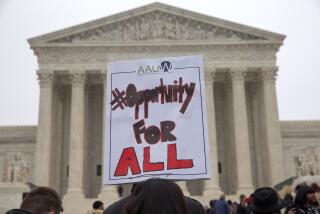Hortonism Isn’t Racism, But It Is a Great Lie
- Share via
In all of the discussion of the “quotas” controversy over the 1991 civil-rights bill, few have troubled to point out that President Bush’s alternative bill would also have shifted the burden of proof on discrimination to employers. The only difference on this key point--the crux of the whole “quotas” argument--is over what the employer is required to prove: a “significant and manifest relationship to . . . job performance” (Democrats) versus “serves in a significant way . . . legitimate employment goals” (Bush). Yet Bush has managed to paint this as the difference between vile quotas and noble civil rights.
This Republican marketing of the quota issue has been brilliant and despicable. It is Willie Hortonism redux. Not that anyone who prefers one version of a civil-rights bill to another is necessarily racist. But Hortonism isn’t racism. Hortonism is the cynical concoction of a divisive issue in the political laboratory for narrow electoral advantage. It has familiar features.
First, Hortonism is inflammatory but essentially beside the point. Prison furloughs? The Pledge of Allegiance? It’s true, as conservatives keep noting, that fiddling with the job-discrimination law won’t solve the real problems of family, education, crime, drugs that ail black America. But the proponents of this mild palliative are not the ones who have made it Topic A on the political agenda. The law would have been enacted without fuss last year if someone hadn’t vetoed it with a huge flourish. It is Bush & Co. who are out to persuade Americans that discrimination in favor of blacks and women is our leading social malady.
A second feature of Hortonism is that complicating details can be counted on to melt away. The press cannot annotate every reference to “Dukakis’ furlough program for murderers” with the information that it was initiated by his Republican predecessor, and 42 other states had one, too. Nor can reporters explain every time Bush uses the term “quota bill” that the dynamics of his bill and the Democrats’ regarding statistical disparities are almost exactly the same.
Third, comfort is available for sophisticates who might otherwise be bothered by the trivia and demagoguery. The narrow controversy is held to be symbolic of larger issues: crime, patriotism, fair play. And there are factual return volleys, turning on the difference between furloughs for murderers sentenced to life with parole and furloughs for murderers sentenced to life without parole; or the different legal implications of the word “significant” and the word “manifest.” The lie is that these distinctions are what the issue is really about, or that they even begin to justify the symbolic weight they’re given.
Hortonism above all means creating a bogy, a Great Other--criminals, liberals, Harvard Yard elitists, “Beltway interest groups”--a “them” on the other side of some great divide from “us.”
For a politician like Bush, this serves two purposes. First, it masks some problematic reality: that he is a Yale aristocrat, that he actually has no interest in challenging 95% of what postwar liberalism achieved without his help, that the difference between his civil-rights bill and the one he disparages is infinitesimal. Second, it plays on the insecurities many people feel these days about their jobs, their families, their middle-class prosperity. And it does so while distracting them from asking who’s been running the country since 1980.
More to Read
Get the L.A. Times Politics newsletter
Deeply reported insights into legislation, politics and policy from Sacramento, Washington and beyond. In your inbox twice per week.
You may occasionally receive promotional content from the Los Angeles Times.









